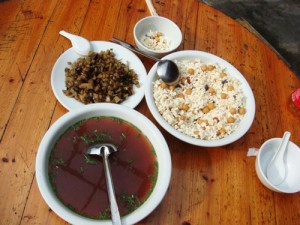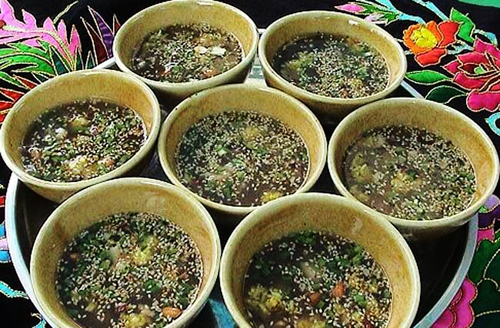Oil tea is the traditional drink of the Dong ethnic minority. In Chinese it is referred to as yaucha or youcha (油茶), which literally means “oil tea”. It is consumed on a daily basis by Dong people, usually as part of their breakfast, but also plays a focal role in festivals and ceremonies, particularly the guest welcoming ceremony. It is perhaps better described as a “tea soup”, since it is thicker than normal tea and contains solid ingredients, such as peanuts. Oil tea comes in many different varieties, including lima-bean tea, red pea tea and white pea tea, although the basic components of the tea remain relatively unchanged.
Firstly, tea seeds are pressed to make what is called tea oil. Although these tea seeds are harvested from tea trees, they do not come from the same species of tea tree as the tea leaves used in the oil tea. Sticky or glutinous rice is cooked so that it is lovely and soft, and then dried out in the sun. After it has dried completely, it is fried in the tea oil until the rice grains puff up like popcorn. Additional ingredients, such as peanuts and soybeans, are then stir-fried. Finally, black or green tea leaves are quickly fried in the hot tea oil until they are crisp. The puffed rice, tea leaves and additional ingredients are added to individual bowls. Before the hot water is poured into the bowl, the host will normally add some extra ingredients to enhance the flavour of the tea, such as pork offal, chopped pork liver, green onions, chopped garlic leaves and salt.
 The ritual surrounding the oil tea is particularly fascinating. Each guest will be presented with a bowl full of the aforementioned ingredients and one chopstick. It is said that Dong women can eat any snack using just one chopstick without piercing the food itself. In this instance, the chopstick is there primarily to indicate when you are done drinking the tea and not as a tool for drinking it. Hot water is then poured into the bowls and the tea is left to steep. Only women will serve the tea and the first bowl is always served to the oldest member of the family or the guest, following thereafter from oldest to youngest. However, out of politeness you should not start drinking the tea until everyone has been served and the hostess indicates you may begin drinking by saying “please”. As a sign of respect, every guest should drink at least three bowls of tea. The first three to four bowls of tea are usually salty, followed by a sweet tea. Once you have drank your fill, you must place the chopstick across your bowl to indicate that you are finished, otherwise the hostess will continue filling your bowl until you are ready to burst!
The ritual surrounding the oil tea is particularly fascinating. Each guest will be presented with a bowl full of the aforementioned ingredients and one chopstick. It is said that Dong women can eat any snack using just one chopstick without piercing the food itself. In this instance, the chopstick is there primarily to indicate when you are done drinking the tea and not as a tool for drinking it. Hot water is then poured into the bowls and the tea is left to steep. Only women will serve the tea and the first bowl is always served to the oldest member of the family or the guest, following thereafter from oldest to youngest. However, out of politeness you should not start drinking the tea until everyone has been served and the hostess indicates you may begin drinking by saying “please”. As a sign of respect, every guest should drink at least three bowls of tea. The first three to four bowls of tea are usually salty, followed by a sweet tea. Once you have drank your fill, you must place the chopstick across your bowl to indicate that you are finished, otherwise the hostess will continue filling your bowl until you are ready to burst!
Oil tea is traditionally served with an array of snacks, including batter-fried fish, pickled vegetables, nuts, and fried corn. One could even say that the oil tea ceremony in Dong culture is like a Chinese version of afternoon tea in England! If you happen to be traveling through a Dong village, some friendly villager will undoubtedly invite you in for a bowl of oil tea. Although it is vastly different from the black tea that we are accustomed to, it is none-the-less healthy, tantalisingly aromatic and unexpectedly delicious. Once you catch the scent of the crispy tea leaves and the steaming bowls of rich, oily tea, we’re sure you’ll want to have a bowl!
